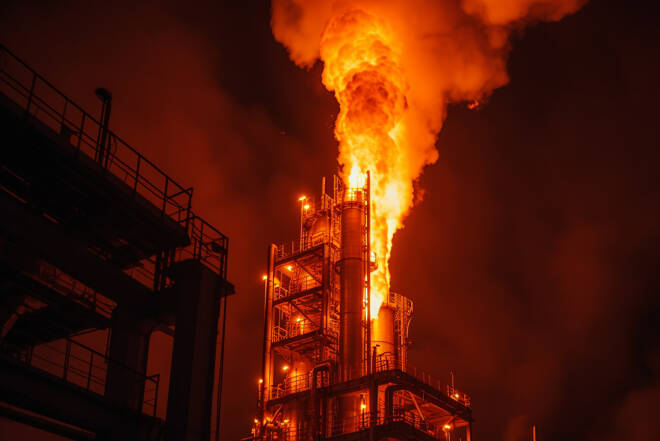Advertisement
Advertisement
Natural Gas News: Prices Steady as Hurricane Milton Sparks Demand Destruction Fears
By:
Key Points:
- U.S. natural gas futures stabilize at $2.711 after sharp Monday selloff driven by Hurricane Milton concerns.
- Hurricane Milton threatens Florida's natural gas-powered grid, raising fears of widespread power outages and demand loss.
- NatGasWeather predicts low natural gas demand through Sunday as Hurricane Milton cools temperatures across Florida.
- Market forecast remains bearish as Gulf production risks are offset by weaker demand from hurricane-induced power outages.
U.S. Natural Gas Futures Hold Steady After Hurricane-Induced Selloff
U.S. natural gas futures are hovering near flat on Tuesday, stabilizing at $2.711 after Monday’s sharp selloff. The recent downturn was driven by growing concerns over demand destruction from Hurricane Milton, which is approaching Florida’s coast.
The Category 4 hurricane is expected to cause significant power outages, affecting the natural gas-powered electricity grid, particularly in Florida, a state highly dependent on natural gas.
Despite Monday’s drop, prices found support at $2.711, a minor pivot level that traders are closely monitoring. Should the market break below this level, further support zones are set at $2.662 and $2.610. On the upside, the major resistance zone stands between $2.937 and $3.110, which had previously capped the rally last Friday at $3.019. This resistance range could continue to be a barrier for any upward movement unless strong bullish momentum emerges.
Weather Forecast and Hurricane Milton’s Impact
NatGasWeather’s October 8-14 forecast calls for generally mild temperatures across the U.S., with highs ranging from 60s to 80s, except for hotter conditions in California, the Southwest, and Texas, where temperatures will climb into the 90s and low 100s. Cooler 50s are expected in the Great Lakes and Northeast, while Florida braces for Hurricane Milton’s arrival. The hurricane is projected to bring heavy rains and winds as it makes landfall late Wednesday, leading to temporary power outages and cooling temperatures, which would dampen natural gas demand.
As a result, overall demand for natural gas is expected to be low through Sunday, with a modest recovery by early next week. This low-demand environment is compounding the bearish sentiment that is currently weighing on the natural gas market.
Production vs. Demand Concerns
Hurricane Milton’s path through the Gulf of Mexico, a significant natural gas production hub, has sparked concerns about potential production disruptions. However, these worries are counterbalanced by the anticipated drop in demand due to power outages and milder temperatures in hurricane-affected areas. Analysts expect the storm to weaken somewhat before making landfall, but it is still forecast to remain dangerous with sustained winds of around 145 mph and potential storm surges of 10-15 feet in the Tampa Bay region.
Market Forecast
Given the current supply and demand trends, the short-term outlook for U.S. natural gas futures remains bearish. The cooling effect from Hurricane Milton and subsequent power outages are likely to suppress demand further, keeping prices under pressure. However, if production disruptions in the Gulf of Mexico materialize, they could provide some support to prices. Traders should keep an eye on weather patterns and any updates on the hurricane’s impact on both production and consumption.
About the Author
James Hyerczykauthor
James Hyerczyk is a U.S. based seasoned technical analyst and educator with over 40 years of experience in market analysis and trading, specializing in chart patterns and price movement. He is the author of two books on technical analysis and has a background in both futures and stock markets.
Advertisement
